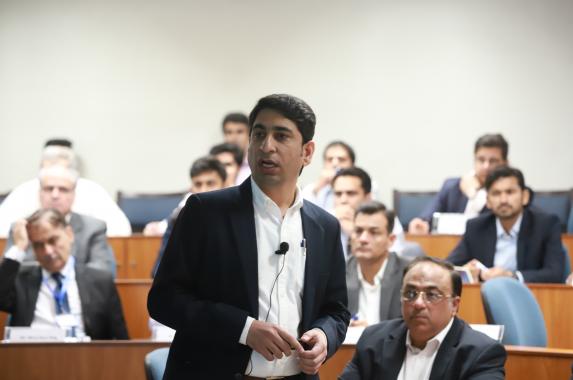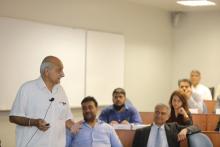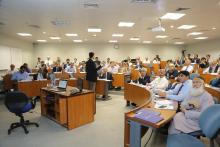
LUMS has been at the forefront of innovation and sustainability in Pakistan. On August 30, a seminar was organised at the Suleman Dawood School of Business (SDSB), LUMS, for the stakeholders of battery electric vehicles (BEVs). The session focused on industry readiness for manufacturing of BEVs in Pakistan, and featured the latest research and viability of the concept, in addition to addressing policy and manufacturing challenges.
The seminar was part of the research efforts being spearheaded at LUMS by faculty members, Dr. Muhammad Shakeel Sadiq Jajja and Dr. Syed Zahoor Hassan, with the support of South Asian Association of Regional Cooperation (SAARC) Energy Centre, Islamabad. Dr. Haritha Saranga from Indian Institute of Management Bangalore (IIMB) participated in the event via Skype. The event was attended by automobile manufacturers, including Atlas Honda, Honda Cars, Porsche Centre Lahore, and Indus Motor Company Limited (Toyota). Other manufacturers, including Millat Equipment Limited, Treet Bikes, United Motors, Volvo-VPL, Road Prince, Sazgar Engineering Works Limited, Songuo Motors, Jolta Motors, and Power Electronics Pakistan were in attendance as well. Representatives from industry and trade associations, including Lahore, Faisalabad, and Gujranwala Chambers of Commerce and Industry; GFC Fans, Fast Cables, Hadron Solar and Uber, as well as government officials from the Engineering Development Board and the Ministry of Climate Change, took part in the event. Additionally, a number of entrepreneurs, academics, and policymakers pioneering the electric vehicle concept in Pakistan and abroad were present.
The seminar was inaugurated by Dr. Alnoor Bhimani, Honourary Dean, SDSB, who emphasised the need for effective policymaking and legislation to enact long term changes. Dr. Syed Zahoor Hassan then led the audience through the basics of battery electric vehicle technology and various technical details. Vehicle market segmentation and global trends in the US, Europe, and China were also discussed. Dr. Saranga pointed out the massive cost of oil imports in India, and how the government has been adopting policies to promote the use of battery electric vehicles through subsidies and incentives for local manufacturers.
Dr. Jajja pointed out existing policy challenges, including the prohibition on registration of electric powered vehicles in Punjab. He also added the importance of considering extreme temperature variations in Pakistan, and shed light on the battery manufacturing processes, step wise localisation techniques, and importing and assembling batteries for BEVs. The EV30@30 campaign, which aims to reduce greenhouse gas emissions with an objective of having 30 percent electric vehicles on roads by 2030, was also discussed. Dr. Naveed Arshad, Dr. Fiaz Chaudhry and Nauman Ahmad Zaffar represented the LUMS Energy Institute and pointed out the economic impact of BEV technology, the need to incentivise local manufacturers, adopt best practices from around the world, and gather all stakeholders on common fora to ensure relevant policymaking with realistic aims and objectives.
An open discussion round catalysed the seminar, with suggestions for development of smart grids, importing cells and batteries, challenges being faced by local motor manufacturers, and levels of industrial readiness to contribute to the BEV manufacturing value chain framework. The audience learnt that GFC Fans was ready to provide induction motors and brushless DC electric motors to local manufacturers. Sociocultural factors likely to adversely impact BEV adoption, such as the requirement for high speeds and extended travel range, were also debated. The session concluded with a demonstration of four battery electric vehicles—two motorcycles, a rickshaw, and a loader rickshaw.










